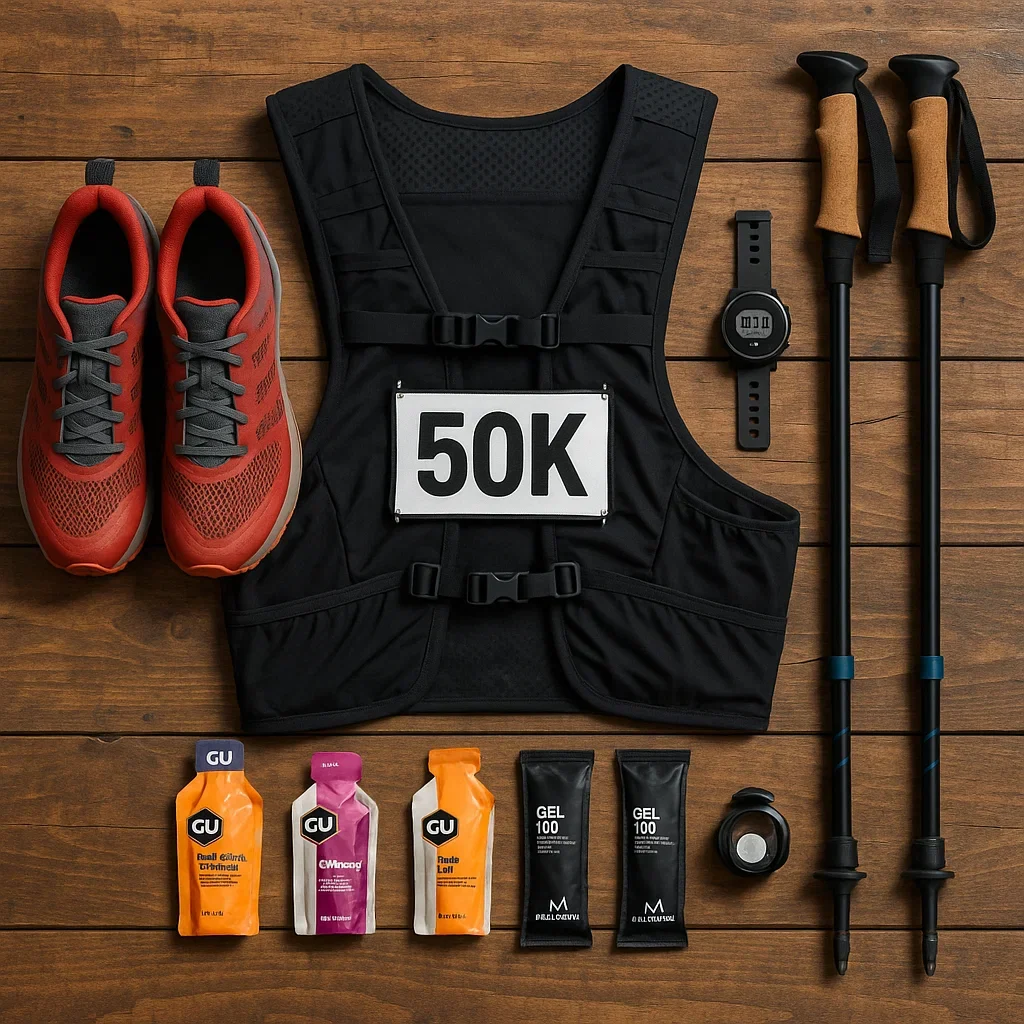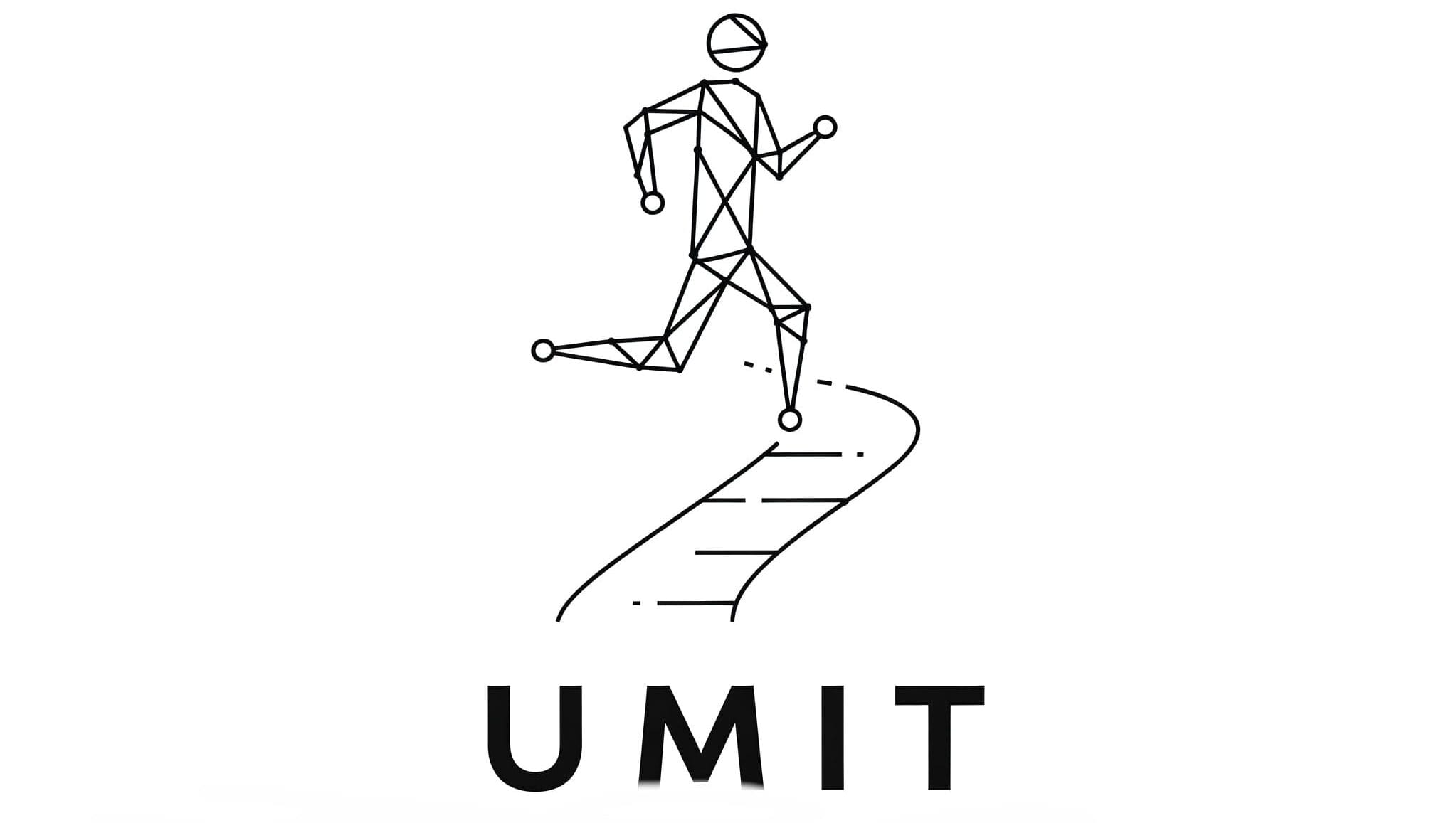Introduction to 50K Ultra Marathons
Welcome to your ultimate guide for conquering a 50K Ultra Marathon—the perfect blend of adventure, endurance, and self-discovery. Whether you’re a seasoned marathoner looking to step up or a trail enthusiast eager to push your limits, this guide is designed to transform you into a 50K ultra runner. From choosing the right race and designing your training plan to mastering nutrition, hydration, and mental toughness, you’ll find everything you need right here.
Running a 50K isn’t just about covering 31 miles—it’s about embracing a challenge that will test your body and mind. Ready to discover your limits? Let’s dive in and build the perfect 50K Ultra Marathon Training Plan.
Definition and Distance
Comparing to a Marathon
Why Train for a 50K?
Types of 50K Races
Setting the Stage

Choosing Your 50K Race
Your ultra marathon training plan for 50K starts with a critical decision: picking the right race. A 50K ultra marathon isn’t just about running 31 miles—it’s about choosing a course that matches your goals, experience, and lifestyle. This section will walk you through the key factors in selecting a race, the differences between trail and road ultras, how elevation and terrain play a role, and how to align your training timeline with your chosen event. With the right race in your sights, your ultra marathon training plan for 50K will have a clear target, making every step of preparation purposeful. Let’s explore how to find the perfect 50K for you.
Selecting the Right Race
Choosing a 50K ultra marathon is like picking a dance partner—it needs to suit your rhythm. Start with the basics: location, date, and reputation. A race close to home cuts travel stress, letting you focus on your ultra marathon training plan for 50K instead of logistics. Check the calendar—spring and fall races often offer milder weather, ideal for first-timers, while summer or winter events might demand extra prep for heat or cold. Reputation matters too; well-organized races with good reviews (think aid station reliability and clear course markings) can make or break your experience.
Consider your goals. Are you aiming to finish your first ultra, or chasing a podium spot? Some 50Ks, like those listed on running sites, cater to beginners with generous cutoffs—think 10+ hours—while competitive races might draw elites with tighter timelines. Look at race websites or runner forums for details like participant numbers (smaller races feel less daunting) and past results to gauge the field. Your ultra marathon training plan for 50K will flow from this choice, so pick a race that excites you and fits your current fitness level.
Trail vs. Road Ultra Marathons
The terrain of your 50K ultra marathon shapes your training, so let’s break down the big divide: trail versus road. Trail ultras dominate the 50K scene, and for good reason—they’re immersive, scenic, and challenging. Picture winding through forests or scrambling up rocky hillsides. Your ultra marathon training plan for 50K trail races needs to prioritize hill work, technical footing, and endurance over speed. Think long runs on uneven paths, not just pounding pavement, to mimic race conditions.
Road 50Ks, though less common, offer a different vibe. Often held on paved loops or gravel paths, they’re flatter and faster, appealing to runners who thrive on consistency. Here, your ultra marathon training plan for 50K might lean on tempo runs and steady-state efforts rather than hill repeats. Some races blend both—like starting on roads and finishing on trails—so check the course map. Trail ultras test adaptability; road ultras reward rhythm. Decide which calls to you, and let that guide your training focus.
Considering Elevation and Terrain
Elevation and terrain are the wild cards of any 50K ultra marathon, and they’ll dictate parts of your ultra marathon training plan for 50K. A flat coastal trail with 500 feet of gain is worlds apart from a mountain race with 5,000 feet of climbing. Elevation isn’t just about uphills—downhills pound your quads, and technical terrain (rocks, roots, mud) slows your pace. Check the race’s elevation profile—most websites provide this—and compare it to your local training grounds.
For high-elevation races, like those in the Rockies, your ultra marathon training plan for 50K should include hill repeats and long runs with significant climbs. If you’re sea-level bound, simulate elevation with treadmill inclines or stair workouts. Terrain matters too—a sandy desert 50K needs different prep (think heat tolerance) than a muddy forest course (think grip and agility). Match your training to the course specifics, and you’ll step to the starting line confident, not rattled.
Planning Your Training Timeline
Once you’ve picked your 50K ultra marathon, it’s time to backtrack and set your training timeline. How long does a solid ultra marathon training plan for 50K take? It depends on your base and the race date. Beginners might need 20-26 weeks to build from a modest weekly mileage—say, 20-30 miles—to race-ready shape. If you’re already running 40 miles a week, 12-16 weeks could suffice, as seen in plans from seasoned coaches like Hal Higdon or Ultra X.
Mark your race date, then count backward. A 16-week ultra marathon training plan for 50K might start with base-building—easy runs to boost stamina—before ramping up long runs and hill work by week six. Factor in a taper—two to three weeks of reduced mileage before race day—to rest your legs. Life happens, so build in buffer weeks for illness or injury. A race six months out gives you flexibility; one three months away demands focus. Align your ultra marathon training plan for 50K with your calendar, and you’ll hit the start line primed to tackle those 31 miles.
Choosing your 50K race isn’t just a checkbox—it’s the foundation of your journey. Whether you’re drawn to a rugged trail or a smooth road, a local gem or a destination event, this decision shapes every run, rest day, and refuel in your ultra marathon training plan for 50K. Get it right, and you’re not just training—you’re building toward a finish line that’s uniquely yours. Next up, we’ll dive into designing that plan to carry you there.

🌟 Your Ultimate 50K Ultra Marathon Training Plan 🌟
Training for a 50K ultra marathon doesn’t have to be confusing. Whether you’re a complete beginner or a seasoned runner, this training plan is designed to fit your level and lifestyle. Simply choose your training level, and follow the structured plan to build your endurance, speed, and mental toughness.
📅 Quick Overview of Training Plans:
| Level | Duration | Weekly Mileage | Long Run Distance | Key Focus |
|---|---|---|---|---|
| Beginner | 20-26 weeks | 30-40 miles | 10-20 miles | Endurance, Consistency |
| Intermediate | 16-20 weeks | 40-60 miles | 15-25 miles | Endurance, Speed, Hills |
| Advanced | 12-16 weeks | 50-75 miles | 20-30 miles | Speed, Back-to-Back Long Runs |
- 📝 Beginner: For those new to ultra running, this plan focuses on building a strong endurance base with gradual mileage increases.
- 🏃♂️ Intermediate: Perfect for runners with marathon experience, balancing endurance with speed and hill work.
- 🏆 Advanced: For experienced runners aiming for faster times, including challenging long runs and back-to-back sessions.
Ready to dive deeper? Let’s break down your 50K training plan step by step.
Why a Structured Plan Matters
An ultra marathon training plan for 50K isn’t optional—it’s your lifeline. Without structure, you’re guessing at mileage, risking burnout or showing up underprepared. A well-designed plan brings consistency, balancing hard runs with rest to build endurance without breaking you. Think of it as a recipe: too much intensity too soon, and you’re sidelined with shin splints; too little, and you’re huffing by mile 20. Consistency is key—studies show structured training improves performance in long-distance events, and for a 50K, that means finishing strong, not just finishing.
Beyond logistics, a plan keeps you accountable. Life’s busy—work, family, that Netflix binge calling your name—but a written ultra marathon training plan for 50K gives you a daily mission. It’s mental prep too; knowing you’ve logged the miles builds confidence, so when race day nerves hit, you’ve got proof you’re ready. Whether you’re a spreadsheet nerd or a scribble-on-a-napkin type, structure turns ambition into action. Your 50K deserves that.
Choosing the Right Training Duration
How long should your ultra marathon training plan for 50K be? It’s not one-size-fits-all—your starting point and race date set the pace. If you’re new to long-distance running, with a weekly base of 20-30 miles, aim for 20-26 weeks. This gives time to ramp up gradually—think 10-mile long runs growing to 20-25 miles—without overwhelming your legs or mind. Veteran marathoners with 40-50 miles weekly might nail it in 12-16 weeks, leaning on existing stamina to adapt to ultra demands.
Popular plans reflect this range. Hal Higdon’s 26-week ultra marathon training plan for 50K starts slow, perfect for beginners, while Ultra X’s 16-week option suits those with a solid base. Got a race in six months? A 20-week plan with a long taper works. Three months out? A tight 12-week sprint can do it if you’re disciplined. Pick a duration that matches your fitness and timeline—too short, and you’re rushed; too long, and you might peak early. Your ultra marathon training plan for 50K thrives on this balance.
Setting Achievable Goals
Goals give your ultra marathon training plan for 50K direction, but they’ve got to be grounded. Finishing your first 50K? That’s a win—aim for a steady pace, maybe 10-12 minutes per mile on trails, to cross the line in 6-8 hours. Seasoned runner? Maybe you’re eyeing a time—say, under 6 hours—or a top-20 finish in a competitive field. Check past race results for a benchmark; a flat road 50K might average 8-minute miles, while a hilly trail could push 14.
Break it down: short-term goals like hitting a 15-mile long run by week eight keep you motivated, while the big prize—conquering 31 miles—looms ahead. Be realistic—overreaching risks injury or disappointment. Your ultra marathon training plan for 50K should stretch you, not snap you. Factor in course difficulty too; 5,000 feet of elevation means a slower pace than a pancake-flat route. Set goals you can measure—miles, time, or just feeling strong—and tweak them as you progress.
Customizing Your Plan
No two runners are alike, so your ultra marathon training plan for 50K should wear your fingerprints. Start with your experience. Beginners need lower mileage—say, 30-40 miles weekly at peak—focusing on time on feet (3-5 hours for long runs) over speed. Intermediate runners, comfy at 50-60 miles, can weave in tempo runs or hill repeats. Advanced folks pushing 80-95 miles might add back-to-back long runs—20 miles Saturday, 15 Sunday—to mimic race fatigue.
Life’s realities matter too. Got a 9-to-5? Schedule long runs for weekends, midweek runs shorter and flexible—swap a Tuesday hill session for Wednesday if rain hits. Trail runner? Prioritize rugged routes over pavement. Road 50K ahead? Focus on steady-state efforts. Customization isn’t just about fitness—it’s about fit. A cookie-cutter ultra marathon training plan for 50K might say “run 10 miles Wednesday,” but if your kid’s soccer game’s that night, shift it. Make it yours, and you’ll stick with it.
Tweak for the course too. High elevation? Add hill work early—repeats at 80% effort build strength. Flat and fast? Practice race pace on long runs. Your ultra marathon training plan for 50K should mirror your race’s DNA—check the elevation profile and terrain, then adjust. Tools like Strava or a coach can refine this, but even pen and paper work. The goal? A plan that feels less like a chore and more like a partner, carrying you to that 50K finish line.
Designing your ultra marathon training plan for 50K is where the rubber meets the
Key Components of a 50K Ultra Marathon Training Plan
Now that you’ve designed your ultra marathon training plan for 50K, it’s time to fill it with the building blocks that’ll carry you across 31 miles. This section breaks down the key components—long runs, midweek workouts, speed work, hill training, strength and cross-training, and rest days—that make your plan tick. Each piece plays a role in building the endurance, strength, and resilience you’ll need for race day. Let’s unpack these essentials and show you how to weave them into your ultra marathon training plan for 50K success.
The Role of Long Runs
Long runs are the heart of your ultra marathon training plan for 50K. They’re where you teach your body to keep going when the miles pile up. Start with what you can handle—say, 10-12 miles if you’re a beginner—and build gradually, adding 1-2 miles weekly. Aim to peak at 20-25 miles, or 4-5 hours on your feet, about three weeks before race day. That’s the sweet spot for most 50K plans, mimicking the time you’ll spend running without overtaxing you.
For trail ultras, do these on similar terrain—rocky paths or hills—to prep your legs and mind. Road runners can stick to pavement, focusing on steady effort. Don’t just run—practice fueling too; test gels or snacks every 45 minutes to nail your race-day strategy. Your ultra marathon training plan for 50K hinges on these runs—they build stamina, boost confidence, and teach you to push past fatigue.
Midweek Running Workouts
Midweek runs keep your ultra marathon training plan for 50K humming between long efforts. These aren’t throwaways—they build your weekly mileage and sharpen your fitness. For beginners, two or three easy runs of 5-8 miles keep the legs loose—think conversational pace, around 60-70% effort. Intermediate runners can mix in a tempo run—say, 6 miles at a “comfortably hard” pace—to boost aerobic capacity.
Schedule them smartly—Tuesday and Thursday work well, leaving room for rest or harder sessions. Trail runners might hit rolling paths; road folks can use flats. Build mileage over weeks—say, from 20 to 40 total—without jumping too fast (10% rule applies). These runs in your ultra marathon training plan for 50K are glue, holding the big efforts together and keeping you race-ready.
Speed Work for Ultra Runners
Speed work in an ultra marathon training plan for 50K? Yep, it’s a debate, but it has a place—especially for road ultras or faster goals. Not every plan includes it—Hal Higdon skips it for beginners, focusing on endurance—but intermediate or advanced runners might benefit. Think short intervals: 6×800 meters at 5K pace with 2-minute jogs, or hill sprints to mimic trail bursts.
Keep it light—once a week, max—since 50K success leans on stamina, not speed. Trail runners can swap traditional speed for fartleks—alternating fast and slow on uneven ground—to build agility. If your race is flat and fast, speed sharpens your edge; if it’s a slog, skip it. Your ultra marathon training plan for 50K should match your race vibe—speed’s optional, not mandatory.
Hill Training for Trail Ultras
Hill training is non-negotiable for trail runners in an ultra marathon training plan for 50K. Most 50Ks—especially trails—pack elevation, and your legs need to handle it. Start with repeats: find a steep hill, run up 2-3 minutes at 80-90% effort, jog down, repeat 4-6 times. Build to longer climbs—say, a 5-mile run with 1,000 feet of gain—mirroring your race profile.
Don’t just go up—practice downhills too; they trash quads if you’re not ready. Hit these weekly, maybe Thursdays, blending them with long runs later. Road runners can ease off, but even flat courses might have rollers, so a few hill sessions won’t hurt. In your ultra marathon training plan for 50K, hills build power and prep you for the real deal—those race-day climbs won’t faze you.

Strength and Cross Training
Strength and cross-training supercharge your ultra marathon training plan for 50K by bulletproofing your body. Running 31 miles stresses joints and muscles—strength work fights back. Twice weekly, hit core (planks, bridges), legs (squats, lunges), and hips (clamshells)—15-20 minutes keeps it simple. Gym buffs can add weights; bodyweight works fine too. It’s about injury prevention—strong hips stop IT band woes, a solid core keeps form when you’re tired.
Cross-training—think cycling, swimming, or yoga—once or twice a week boosts cardio without pounding. A 45-minute spin replaces an easy run, saving joints. Yoga stretches tight hamstrings, aiding recovery. Slot these on lighter days—say, Wednesday or Sunday—and your ultra marathon training plan for 50K gets a resilience boost, keeping you in the game.
Rest and Recovery Days
Rest isn’t slacking—it’s a pillar of your ultra marathon training plan for 50K. Without it, you’re courting overtraining—fatigue, soreness, or worse. Plan at least one full rest day weekly—Monday’s a classic post-long-run pick—where you do nada beyond stretching or a short walk. Fridays can ease into weekends too. Active recovery—light yoga or a 2-mile shuffle—works if you’re antsy, but keep it chill.
Listen to your body: lingering aches or a blah mood mean extra rest, not pushing through. Your ultra marathon training plan for 50K needs this breather—muscles rebuild stronger, and your mind resets. Taper before race day—cut mileage 50% two weeks out, 75% the last week—and you’ll hit the start line fresh, not fried.
These components—long runs to rest—form the engine of your ultra marathon training plan for 50K. Blend them right, and you’re not just running 31 miles—you’re owning them. Next, we’ll map out a weekly schedule, turning these pieces into a rhythm that gets you race-ready.
Weekly Schedule for 50K Training
You’ve got the pieces of your ultra marathon training plan for 50K—now it’s time to put them into a weekly rhythm. This section lays out schedules for beginners, intermediates, and advanced runners, plus a sample week to see it in action. A solid weekly schedule balances mileage, intensity, and rest, tailoring your ultra marathon training plan for 50K to your level while building you up for those 31 miles. Whether you’re starting small or pushing big miles, here’s how to structure your week for ultra success.
Beginner 50K Training Schedule
If you’re new to ultras or running 20-30 miles weekly, your ultra marathon training plan for 50K starts gentle but firm. Aim for 30-40 miles at peak, focusing on time on feet over speed—3-5 hours for long runs is your gold standard. Beginners need gradual buildup to avoid burnout or injury, so a 20-26 week plan works best, giving your body time to adapt.
Your week might look like this: Monday off—full rest after the weekend. Tuesday, an easy 5-6 miles at a chatty pace. Wednesday, 6-8 miles with a few hill strides if trails loom ahead. Thursday, another easy 5-6 miles. Friday, rest or a light 3-mile shakeout. Saturday’s the big one—start at 10 miles, build to 20 over weeks, on terrain like your race. Sunday, a recovery 4-6 miles, slow and steady. This keeps your ultra marathon training plan for 50K sustainable—low intensity, high consistency.
Intermediate 50K Training Schedule
Got a marathon under your belt or a 40-50 mile weekly base? Your intermediate ultra marathon training plan for 50K steps it up, targeting 50-65 miles at peak over 16-20 weeks. You’re ready for more volume and a touch of intensity, balancing endurance with race-ready fitness. This level suits runners comfy with 15-mile long runs who want to conquer a 50K with confidence.
Here’s the flow: Monday off—rest is still king. Tuesday, 8-10 miles easy, keeping it relaxed. Wednesday, 8-10 miles with a tempo chunk—say, 4 miles at a hard-but-controlled pace—to boost stamina. Thursday, 6-8 miles with hill repeats (5×2 minutes) for trail prep or flat pace for roads. Friday, rest or a 4-mile easy jog. Saturday, long run from 15 to 25 miles, peaking 3-4 weeks out. Sunday, 6-8 miles recovery. Your ultra marathon training plan for 50K here builds toughness without breaking you—perfect for the middle ground.
Advanced 50K Training Schedule
For seasoned runners logging 60+ miles weekly, your ultra marathon training plan for 50K goes big—75-95 miles at peak over 12-20 weeks. You’re chasing performance, maybe a fast time or top finish, and can handle back-to-back long efforts. This isn’t for the faint-hearted—it’s for those who live for the grind and recover like champs.
Your week: Monday off or a 5-mile recovery if you’re ironclad. Tuesday, 10-12 miles easy. Wednesday, 10-12 miles with speed—6x1K at 10K pace—or tempo if trails rule. Thursday, 8-10 miles with hills (6×3 minutes) or steady effort. Friday, 6-8 miles easy to bridge to the weekend. Saturday, 20-30 miles, pushing 5-6 hours on race-like terrain. Sunday, 10-15 miles, moderate pace to mimic race fatigue. Your ultra marathon training plan for 50K at this level is a beast—high volume, high reward.
Sample Weekly Plan
Let’s see it in action with a sample week from a 16-week ultra marathon training plan for 50K—say, week 10 for an intermediate runner. This assumes a trail race with moderate hills, blending the components we’ve covered. Adjust mileage or intensity for your level, but here’s a snapshot:
- Monday: Rest—zero miles, stretch or foam roll.
- Tuesday: 8 miles easy, 10:00-11:00 min/mile on flat trails—relaxed effort.
- Wednesday: 10 miles with 4-mile tempo at 8:30-9:00 min/mile—push, then cool down.
- Thursday: 7 miles with 5×2-minute hill repeats at 80% effort, jog down—trail strength.
- Friday: Rest or 4 miles easy, 11:00 min/mile—shakeout if you’re antsy.
- Saturday: 20 miles long run, 4-5 hours on rolling trails—practice fueling every 45 minutes.
- Sunday: 6 miles recovery, 11:30-12:00 min/mile—keep it slow, recover.
Total: 55 miles. This week in your ultra marathon training plan for 50K hits endurance (Saturday), strength (Thursday), stamina (Wednesday), and recovery (Monday, Friday, Sunday). Tweak for your race—more hills for mountains, flatter for roads—but it’s a solid mid-plan peak before tapering.
Your weekly schedule is the pulse of your ultra marathon training plan for 50K. Beginners ease in with 30-40 miles, intermediates hit 50-65 with purpose, and advanced runners crush 75-95 for glory. The sample week shows how it flows—rest, run, recover, repeat. It’s your blueprint to 31 miles, flexible enough for life’s curveballs but firm enough to get you there. Next, we’ll fuel that engine with nutrition and hydration tips for your ultra marathon training plan for 50K.

🍏 Nutrition and Hydration Essentials for 50K Ultra Running
Fueling your body properly is the secret to a successful 50K ultra marathon. This section will guide you through everything you need to know about nutrition and hydration—both during training and on race day. 🏃♂️💪
🥗 ✅ Training Nutrition: What to Eat
- Pre-Run Meals: 90 minutes before a long run, aim for a light meal with complex carbs and a bit of protein.
- 🌾 Example: Oatmeal with banana and a drizzle of peanut butter.
- 🥖 Alternative: Whole-grain toast with avocado and a sprinkle of salt.
- During Training Runs:
- For runs over 90 minutes, consume 200-300 calories per hour.
- 🚀 Options: Energy gels, dried fruits, trail mix, or a peanut butter sandwich.
- Post-Run Recovery:
- Replenish with a carb-protein combo within 30 minutes.
- 🍌 Example: A protein shake with berries and a scoop of protein powder.
- 🥤 Hydrate with water or an electrolyte drink.
💧 ✅ Hydration Tips for Ultra Running:
- Daily Hydration: Aim for at least 2-3 liters of water per day.
- During Runs: Sip 4-8 ounces every 15-20 minutes. For long runs, consider electrolyte drinks with sodium and potassium.
- Race Day Hydration Strategy:
- Carry a hydration pack (1-2 liters) or handheld bottle.
- Add electrolyte tablets (e.g., NUUN, SaltStick) to your water.
🍽️ ✅ Sample Race Day Nutrition Plan:
- Breakfast (2-3 hours before race):
- Whole-grain toast with peanut butter and a banana.
- Coffee or tea (if you’re used to it).
- During the Race (200-400 calories/hour):
- Gels every 45 minutes (GU, Clif Shot).
- Real food options: Salted potatoes, pretzels, PB&J bites.
- Electrolyte drink sipped throughout.
- Post-Race Recovery:
- Protein shake or smoothie within 30 minutes.
- A balanced meal with carbs, protein, and healthy fats within 2 hours.
🎒 Essential Gear for 50K Ultra Marathons
Having the right gear can make or break your 50K ultra marathon experience. This section will guide you through the essential equipment you need, from shoes to hydration packs, ensuring you’re fully prepared for any trail or road adventure. 🌄🏃♂️
👟 ✅ Choosing the Right Shoes:
- For Trail Runners: Prioritize grip and protection.
- 🌲 Best Options (2025): Salomon Ultra Glide 2, Hoka Speedgoat 5, Altra Lone Peak 7.
- For Road Runners: Opt for cushioned comfort with responsive support.
- 🛣️ Best Options (2025): Nike ZoomX Invincible 3, Brooks Ghost 15, ASICS Gel-Nimbus 25.
- Pro Tip: Size up half a size to account for foot swelling during long runs.
🎽 ✅ Clothing for All Conditions:
- Warm Weather:
- Lightweight, moisture-wicking tops (Nike Dri-FIT, Patagonia Capilene).
- Running shorts or tights with anti-chafe fabric.
- Sweat-wicking headband or cap.
- Cold Weather:
- Base layer (Smartwool Merino), windproof jacket (Gore-Tex Paclite).
- Gloves and a beanie for cold starts.
- Rainy Conditions:
- Waterproof jacket (Salomon Bonatti Pro, Arc’teryx Norvan).
- Quick-dry socks (Darn Tough, Balega).
🏃♂️ ✅ Must-Have Gear for Ultra Running:
- Hydration System:
- 💧 Hydration Vest: Salomon ADV Skin 12 (1-2L capacity).
- 🍼 Handheld Bottle: Nathan ExoShot 2.0 (355 ml).
- 🚰 Electrolyte Tablets: NUUN, SaltStick.
- Nutrition Storage:
- Waist Belt: Ultimate Direction Race Belt.
- Pocket-friendly Gels: GU Energy, Clif Shot.
- GPS Watch:
- 📍 Recommended: Garmin Forerunner 965, Coros Vertix 2.
- 💡 Pro Tip: Set alerts for hydration and nutrition during the race.
- Lighting (For Early/Late Runs):
- 💡 Headlamp: Black Diamond Spot 400.
- 🔋 Spare Batteries (or USB Rechargeable).
- Safety Essentials:
- 📦 Emergency Kit: Bandages, space blanket, whistle.
- 📱 Phone (in a waterproof case).
📋 ✅ Ultimate Race Day Packing List:
| Item | Purpose | ✅ Check |
|---|---|---|
| Trail/Road Shoes | Comfort and traction | ✅ |
| Running Socks | Anti-blister protection | ✅ |
| Running Apparel | Weather-appropriate | ✅ |
| Hydration Pack | Fluids and electrolytes | ✅ |
| GPS Watch | Track pace and distance | ✅ |
| Energy Gels/Fuel | Mid-race nutrition | ✅ |
| Headlamp (if needed) | Night or early starts | ✅ |
| Emergency Kit | Safety and first aid | ✅ |
| Phone (Charged) | Communication and tracking | ✅ |
🧠 Mastering Your Mind: Mental Preparation for 50K Ultra Marathons
A 50K ultra marathon is as much a mental challenge as it is physical. To conquer those 31 miles, you must train your mind as well as your body. Here’s how to build unstoppable mental strength. 💪🧠
🌟 ✅ Visualization: See Yourself Succeeding
- Close Your Eyes: Picture yourself crossing the finish line strong, smiling, and proud.
- Focus on Milestones: Imagine hitting key checkpoints—aid stations, the halfway point, and the final mile.
- Practice Weekly: Spend 5-10 minutes before each long run visualizing your success.
📌 ✅ Positive Self-Talk and Mantras:
- Choose Your Mantra: Simple, powerful phrases to keep you motivated:
- 💪 “One step at a time.”
- 🚀 “I am strong. I am unstoppable.”
- 🌲 “Every mile is a victory.”
- Use Mantras When Struggling: Repeat them out loud or in your head during tough moments.
⏳ ✅ Breaking the Race into Manageable Chunks:
- Divide Your 50K: Mentally split the race into smaller sections (5K intervals, aid station to aid station).
- Stay Present: Focus on reaching the next milestone instead of the entire distance.
🔄 ✅ Mental Resilience: Embrace the Struggle:
- Accept the Pain: Remind yourself that discomfort is temporary and part of the journey.
- Problem-Solve: If you encounter an issue (blisters, cramps), calmly decide how to fix it rather than panic.
- Positive Reframing: Instead of “I’m exhausted,” think “I’m becoming stronger.”
💬 ✅ Practice Mindfulness During Training:
- Stay Aware: Focus on your breathing, the rhythm of your feet, and the scenery around you.
- Ground Yourself: When anxiety hits, touch a tree, take a deep breath, or focus on a small detail.
- Smile: Studies show that smiling, even when forced, can boost your mood and energy. 🙂
💡 ✅ Emergency Mental Toolkit: What to Do When Things Get Tough:
Cramping or Fatigue: Sip water, take an electrolyte tablet, and focus on a short-term goal (next tree, next turn).
Feeling Overwhelmed: Slow down, walk for a few minutes, and breathe deeply.
Negative Thoughts Taking Over: Use your mantra, or think of a loved one cheering for you.
🛌 Recovery After 50K Ultra Marathon: Bounce Back Strong
Finishing a 50K is an incredible achievement! But your journey doesn’t end at the finish line—proper recovery is crucial to ensure your body bounces back stronger and healthier. Here’s how to recover effectively after your ultra marathon. 💪🏃♂️
🥤 ✅ Immediate Post-Race Recovery (First 30 Minutes)
- Rehydrate: Drink at least 500 ml of water or an electrolyte drink.
- Refuel: Aim for a snack with a 3:1 ratio of carbs to protein.
- 🥤 Example: A protein shake with a banana.
- 🍞 Alternative: Whole-grain sandwich with turkey and veggies.
- Stretch and Cool Down: Spend 10-15 minutes doing light stretching to relax your muscles.
- Mental Check-In: Reflect on your race—celebrate your success! 🎉
🕰️ ✅ The First 24 Hours: Rest and Active Recovery
- Sleep: Aim for 8-10 hours to allow muscle repair.
- Nutrition: Focus on balanced meals with plenty of vegetables, whole grains, and lean protein.
- 🥗 Recovery Meal: Quinoa salad with chickpeas and roasted vegetables.
- Hydration: Continue to sip water throughout the day—aim for 2-3 liters.
- Gentle Movement: Light walking or easy cycling (20-30 minutes) to promote blood circulation.
📆 ✅ The Next Few Days: Structured Recovery
- Day 2-3: Gentle cross-training (swimming, yoga) for 30-45 minutes.
- Day 4-5: Easy runs (20-30 minutes) at a relaxed pace.
- Day 6-7: Rest or light activity (walking or stretching).
- Week 2: Gradually reintroduce regular training—focus on short, easy runs and low-impact activities.
🦵 ✅ Long-Term Recovery Tips:
- Foam Rolling: Use a foam roller daily for calves, quads, hamstrings, and IT band.
- Massage: A sports massage after the first week can help with deeper muscle recovery.
- Strength Training: After two weeks, start with low-weight, high-repetition strength sessions.
- Nutrition Continuation: Incorporate anti-inflammatory foods like turmeric, ginger, and leafy greens.
- Monitoring: Keep an eye on lingering soreness—if it lasts more than two weeks, consider consulting a physiotherapist.
🌟 ✅ Mental Recovery: Processing the Experience
- Reflect on Your Race: Write down your thoughts—what went well, what could be improved.
- Talk About It: Share your story with fellow runners or online communities.
- Set a New Goal: Whether it’s another ultra or a recovery 10K, planning ahead keeps motivation high.
🚨 ✅ Warning Signs (When to Rest More):
- Persistent joint pain or swelling.
- Unusual fatigue lasting more than a week.
- Sharp pain during light activities.
- Unresolved muscle soreness after two weeks.
If any of these occur, prioritize rest and consult a medical professional.
❓ Frequently Asked Questions
💡 What is a 50K Ultra Marathon?
A 50K Ultra Marathon is approximately 31 miles, making it the shortest standard ultra distance, beyond the traditional marathon (26.2 miles).
📅 How long should I train for a 50K Ultra Marathon?
Beginners should aim for 20-26 weeks of training, while experienced runners may prepare in 12-16 weeks.
🏃♂️ What is the ideal weekly mileage for 50K training?
Beginners should target 30-40 miles per week, intermediates 40-60 miles, and advanced runners 50-75 miles at peak.
🍏 What should I eat before a 50K race?
A balanced meal with complex carbs and protein, like oatmeal with banana or a peanut butter sandwich, is ideal.
💧 How do I stay hydrated during a 50K ultra marathon?
Sip water every 15-20 minutes and use electrolyte drinks for runs over two hours.
🚀 Do I need speed training for a 50K?
Not necessarily. Speed training is optional for beginners but can benefit intermediate and advanced runners aiming for faster times.
🏞️ Should I train on trails or roads for a 50K?
It depends on your race type. Train on trails if your 50K is a trail race, or on roads for road races.
🎽 What gear do I need for a 50K ultra marathon?
Trail shoes, hydration vest, GPS watch, energy gels, and weather-appropriate clothing are essential.
🧠 How can I mentally prepare for a 50K?
Practice visualization, use positive mantras, and break the race into smaller sections in your mind.
🛌 How should I recover after a 50K ultra marathon?
Rehydrate, eat a balanced recovery meal, rest, and use gentle activities like yoga or walking in the following days.
🚶 Can I walk during a 50K ultra marathon?
Absolutely. Walking is a common strategy for steep hills or as part of a run-walk method.
🌧️ What should I do if it rains during my 50K race?
Wear a waterproof jacket, use moisture-wicking socks, and pack dry gear in your drop bag.
🍌 What snacks are best for 50K fuel?
Energy gels, salted potatoes, peanut butter sandwiches, and electrolyte drinks are excellent choices.
📍 How do I choose the right 50K race?
Consider location, terrain, weather, and your experience level. Start with a beginner-friendly race.
🔄 How often should I do long runs in training?
One long run per week is standard, gradually increasing the distance over time.
💪 How can I prevent injuries during 50K training?
Warm up properly, use strength training, maintain good running form, and avoid rapid mileage increases.
🔥 How do I stay motivated for 50K training?
Set clear goals, track your progress, run with friends, and remind yourself of your why.
🌟 Can I train for a 50K without a coach?
Yes, with a well-structured training plan like this guide, self-training is entirely possible.
🌄 Should I include hill training for 50K?
Yes, especially for trail races. Hill training builds strength and stamina.
🎯 How do I set realistic 50K race goals?
Base your goal on your training, experience, and the course difficulty. Start with a goal to finish strong.
📚 Further Reading
🏃♂️ The Mental Marathon: Beyond the Physical in Ultra Running
Discover mental strategies for pushing your limits in ultra marathons.
Read More ➡️🌧️ Ultra Marathon Recovery Techniques
Explore advanced recovery methods to boost your post-race healing.
Read More ➡️🧠 How to Train for an Ultra Marathon
A complete guide from base building to race day preparation.
Read More ➡️🌐 External Resources:
✅ 50K Ultra Marathon Quiz
Test your knowledge on 50K Ultra Marathon training, nutrition, and recovery. Good luck! 🚀
1. What is the standard distance of a 50K ultra marathon?
Show Answer
31 miles (50 kilometers).
2. How long should a beginner train for a 50K ultra marathon?
Show Answer
20-26 weeks.
3. What is an ideal pre-race meal for a 50K?
Show Answer
Whole-grain toast with peanut butter and a banana.
4. How often should you consume electrolytes during a 50K?
Show Answer
Every 15-20 minutes, depending on sweat rate.
5. What is the best type of shoe for a trail 50K?
Show Answer
Trail running shoes with good grip and protection.
6. Should you train on hills for a 50K?
Show Answer
Yes, especially if the race has significant elevation gain.
7. How do you mentally prepare for a 50K?
Show Answer
Practice visualization, use positive mantras, and set small goals.
8. What is a good recovery meal after a 50K?
Show Answer
A balanced meal with carbs, protein, and healthy fats, like a quinoa salad with beans.
9. What is a “bonk” in ultra running?
Show Answer
A sudden drop in energy due to low glycogen levels.
10. What is the most important gear for a 50K?
Show Answer
Hydration pack, trail shoes, and energy gels.
🚀 Share This 50K Ultra Marathon Guide!
Did you find this guide helpful? Share it with your friends on social media!
🌟 Final Thoughts
Congratulations on making it through this comprehensive 50K Ultra Marathon Training Guide! Whether you’re just starting your ultra running journey or aiming for a personal best, remember that the path to success is built on consistency, patience, and a strong mindset. 💪
Keep challenging yourself, listen to your body, and never stop learning. Your next great adventure is just around the corner! 🌄
Have any questions, tips, or experiences to share? Leave a comment below or explore our other guides for more ultra running wisdom.

About the Author
Lost Pace is an ultramarathon runner, shoe-tester and the founder of umit.net. Based year-round in Türkiye’s rugged Kaçkar Mountains, he has logged 10,000 + km of technical trail running and completed multiple 50 K–100 K ultras.
Blending mountain grit with data, Lost analyses power (CP 300 W), HRV and nutrition to craft evidence-backed training plans. He has co-written 260 + long-form guides on footwear science, recovery and endurance nutrition, and is a regular beta-tester of AI-driven coaching tools.
When he isn’t chasing PRs or testing midsoles, you’ll find him sharing peer-reviewed research in plain English to help runners train smarter, stay healthier and finish stronger.
Ultrarunner · Data geek · Vegan athlete

